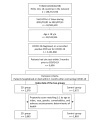Zinc Deficiency and Post-acute Outcomes in Patients With COVID-19: A Six-Month Retrospective Cohort Analysis of 3,726 Patients
- PMID: 39553000
- PMCID: PMC11566094
- DOI: 10.7759/cureus.71609
Zinc Deficiency and Post-acute Outcomes in Patients With COVID-19: A Six-Month Retrospective Cohort Analysis of 3,726 Patients
Abstract
Background Previous studies have suggested that zinc deficiency (ZD) may increase the risk of short-term mortality in patients with coronavirus disease 2019 (COVID-19). However, the relationship between zinc status and post-acute COVID-19 outcomes remains unclear. This study aimed to determine the association between ZD and long-term outcomes in patients with COVID-19. Methodology We conducted a retrospective cohort study using the TriNetX database, including patients aged 18 years or older diagnosed with COVID-19 between January 1, 2022, and July 31, 2023. Patients had documented serum or plasma zinc levels within three months before COVID-19 diagnosis and were not deceased or hospitalized in the first month of infection. They were categorized into ZD (zinc levels <70 μg/dL) and control (zinc levels ≥70 μg/dL) groups. After 1:1 propensity score matching for demographic and clinical variables, outcomes were assessed from 30 to 180 days post-diagnosis, including all-cause hospitalization, all-cause mortality, and four subphenotypes of post-acute COVID-19. Hazard ratios (HRs) with 95% confidence intervals (CIs) were calculated. Results After matching, each group included 1,863 patients with balanced baseline characteristics. The ZD group had a higher incidence of all-cause hospitalization (25.3% vs. 20.3%; HR = 1.314; 95% CI = 1.148-1.505; p < 0.001) and all-cause mortality (3.8% vs. 2.2%; HR = 1.735; 95% CI = 1.180-2.551; p = 0.045) compared to the control group during the follow-up period. Among the four subphenotypes, only the cardiac and renal subphenotype showed a significantly higher risk in the ZD group (HR = 1.099; 95% CI = 1.002-1.205; p = 0.004). Conclusions ZD is associated with increased risks of long-term hospitalization, mortality, and increased risk in COVID-19 patients with cardiac and renal comorbidities. Monitoring and managing zinc levels may be important for improving long-term outcomes. Further research is warranted to explore the potential benefits of zinc supplementation in COVID-19 patients with ZD.
Keywords: covid-19; long covid-19; mortality; post-acute covid-19; zinc deficiency.
Copyright © 2024, Hung et al.
Conflict of interest statement
Human subjects: Consent was obtained or waived by all participants in this study. Institutional Review Board of the Chi Mei Medical Center issued approval 11302-E01. Animal subjects: All authors have confirmed that this study did not involve animal subjects or tissue. Conflicts of interest: In compliance with the ICMJE uniform disclosure form, all authors declare the following: Payment/services info: All authors have declared that no financial support was received from any organization for the submitted work. Financial relationships: All authors have declared that they have no financial relationships at present or within the previous three years with any organizations that might have an interest in the submitted work. Other relationships: All authors have declared that there are no other relationships or activities that could appear to have influenced the submitted work.
Figures
References
-
- The association between zinc deficiency, and clinical outcomes of COVID-19. Wu JY, Hsu WH, Tsai YW, et al. J Infect. 2023;87:0–7. - PubMed
-
- TriNetX. [ Feb; 2024 ]. 2024. https://trinetx.com/ https://trinetx.com/
LinkOut - more resources
Full Text Sources



